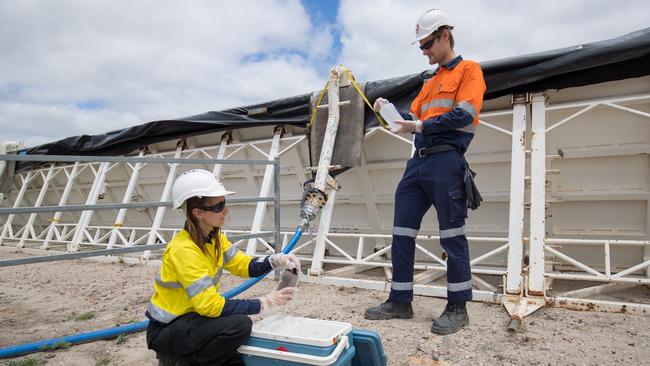Landmark CSIRO fracking study douses pollution fears
The use of fracking to extract coal-seam gas in Queensland has little to no impact on groundwater, a CSIRO study finds.

The use of fracking to extract coal-seam gas in Queensland has little to no impact on groundwater, waterways, soils or air quality, a CSIRO study concluded in findings that boost the industry’s battle to diffuse concerns about environmental damage.
The three-year study measured the impact of hydraulic fracturing, known as fracking, at six coal-seam gas wells operated by Origin Energy in the state’s Surat Basin region near Roma.
It found fracking had little to no impact on air quality with most pollutants below national guidelines and drilling chemicals not detected in water samples from bores, soil near wells or water samples from a nearby creek.
Water produced from gas wells immediately after fracking contained chemicals from the process and high concentrations of salts, ammonia and metal compounds that then reduced to their original state within 40 days.
Gas producers’ water treatment operations reduce these chemicals either completely or to acceptable water quality guideline limits, the study found.
While some biocides and chemicals were degraded in soil samples within two to three days, soil microbial activity was reduced by fracking fluids and produced water.
“We couldn’t find anything where there was chemicals escaping either through air, soil or water,” CSIRO’s Gas Industry Social and Environmental Research Alliance director Damian Barrett told The Australian.
Some 19,000 productive CSG wells have been drilled, with gas sold to Asian buyers through three Queensland LNG export plants and also piped to domestic users in the nation’s eastern states.
CSIRO’s gas unit is a collaboration between Australia’s peak science body, commonwealth and state governments and industry with the task of conducting independent research. Members of the Gisera alliance include all three Queensland LNG exporters: Origin Energy, which operates the APLNG unit, the Shell-owned QGC facility and Santos, which runs the GLNG plant.
Origin paid for 74 per cent, or $245,670, of the phase one funding for the study, while for the second phase the gas industry covered 61 per cent, or $1.28m, of the bill, with CSIRO footing the $826,000 balance.
The research represents the biggest ever investigation in Australia of the controversial drilling method, which involves the injection of a huge volume of fluids into a well to break up coal seams so gas can flow into the well.
Fracking is made up of 90 per cent water, 8-9 per cent sand, which keeps the fractures open, and 1-2 per cent of chemicals such as gelling agents, biocides and corrosion inhibitors.
Critics in local communities and action groups, including Lock The Gate, have been concerned about long-term effects on water supplies and contamination of agricultural land, citing health concerns raised by an unconventional gas boom in the US over the past decade.
The federal government will consider backing gas projects to provide economic stimulus post-COVID-19, while NSW has committed to injecting 70 petajoules of gas into the market by 2022 as it weighs a decision on Santos’s $3.5bn Narrabri CSG project.
The research took into account findings made by NSW and Northern Territory investigations into fracking and CSG.
The CSIRO said it should be used as a tool for communities, regulators and industry. What was important was that “when decisions are made … those decisions should be based on the best quality science and the highest-quality information so the right decision can be made,” Dr Barrett said. “It’s not up to the CSIRO to determine whether or not gas development goes ahead, but we do want to see approvals based on rational information and quality of science.”
A study by the CSIRO’s gas unit last year said CSG used for local electricity supply could cut up to half the greenhouse gas emissions of domestic black coal plants, tentatively backing “cleaner fuel” claims made by the gas industry.
Lock The Gate said at the time that because the five main Queensland gas companies provided more than half the CSIRO’s gas unit funding, it was difficult to take the organisation’s claims seriously.


To join the conversation, please log in. Don't have an account? Register
Join the conversation, you are commenting as Logout